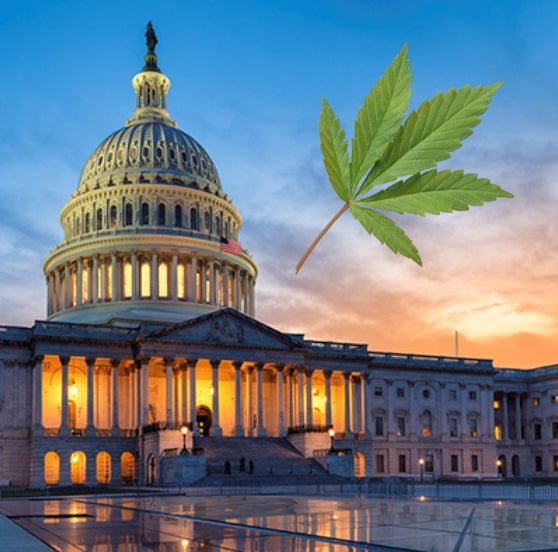The survey results represent a dramatic shift in voters' opinions concerning the politically polarizing issue in the Lone Star State.

As the iconic saying goes, "Everything is bigger in Texas." From its massive display of lucrative oil fields to its almost religious allegiance to the sport of football, everything about the nation's second-largest state is a testament to its unique and larger-than-life identity. Likewise, for much of the state's history, a majority of Texans have taken pride in their conservative, gun-toting, America-first values.
However, a new poll taken recently is shedding light on some seismic and fundamental shifts in attitudes among Texas voters, particularly concerning the legal status of recreational cannabis. As first reported by High Times, the 18th annual Texas Lyceum Poll revealed that 60% of adult Texans say they support adult-use cannabis, which is a substantial 14% increase over the last time the survey asked Texans about marijuana in 2015.
"Overall, 60% of Texas adults say that they support legalizing the use of marijuana in Texas, a 14-point increase since the question was last asked in 2015 when a majority of voters (50%) expressed opposition," the survey said.
"Overall, 60% of Texas adults say that they support legalizing the use of marijuana in Texas, a 14-point increase since the question was last asked in 2015 when a majority of voters (50%) expressed opposition."
- 18th Annual Texas Lyceum Poll
According to the Dallas Morning News, among those interviewed, only older adults, Republicans, and self-identified conservatives were divided regarding support for legalizing recreational cannabis. For those Texans over 65 or identifying as Republican, 49% support legalization. Meanwhile, 46% of conservative voters polled by the survey said they would support legalizing adult-use marijuana, with 31% opposing legalizing cannabis.
While the poll's cannabis legalization results garnered the most media and political attention, the survey also asked about various topics, including politics, religion, housing, and space exploration. Legalized gambling was another issue garnering statewide attention and significant support among those surveyed.
As a result, this coming November, the Texas Lyceum will hold a conference on South Padre Island entitled "Win, Lose or Draw: The Future of Marijuana and Gambling in the Lone Star State."
Although the state has staunchly voted Republican in every general election since 1976, there are signs that the GOP's stranglehold on Texas could be waning. For example, in 2020, then-President Donald Trump only won the state by a meager 6.5% over Joe Biden, the narrowest margin since 1996.
Similarly, attitudes and laws concerning medicinal marijuana in Texas have also softened in favor of human care. Eligible patients can now access low-level THC cannabis under the state's compassionate use program, established in 2015. However, the law only enables certain physicians to prescribe low-THC products to individuals suffering from seizure disorders, multiple sclerosis, and other conditions, including all forms of PTSD and cancer.
In addition, several Texas cities have begun decriminalizing cannabis possession in recent years. In 2022, the cities of Austin, San Marcos, Killeen, Elgin, and Denton passed ordinances or civic policies barring law enforcement officials from enforcing state laws prohibiting the possession or distribution of marijuana.
In response, last February, Texas Attorney General Ken Paxton filed lawsuits against those five municipalities "for adopting amnesty and non-prosecution policies that violate Texas laws concerning marijuana possession and distribution," according to the attorney general's office.
Paxton cited the Texas Local Government Code as part of the suits, which bans municipal and county governments from adopting "a policy under which the entity will not fully enforce laws relating to drugs."
"I will not stand idly by as cities run by pro-crime extremists deliberately violate Texas law and promote the use of illicit drugs that harm our communities. This unconstitutional action by municipalities demonstrates why Texas must have a law to 'follow the law.' It's quite simple: the legislature passes every law after a full debate on the issues, and we don't allow cities the ability to create anarchy by picking and choosing the laws they enforce," Paxton said in a statement on Wednesday.
"I will not stand idly by as cities run by pro-crime extremists deliberately violate Texas law and promote the use of illicit drugs that harm our communities. This unconstitutional action by municipalities demonstrates why Texas must have a law to 'follow the law.' It's quite simple: the legislature passes every law after a full debate on the issues, and we don't allow cities the ability to create anarchy by picking and choosing the laws they enforce."
- Texas Attorney General Ken Paxton
Despite his harsh and aggressive tone, change is coming to Texas, regardless of what Paxton, the governor, or other high-profile state officials feel on the subject of cannabis legalization reform.
As more and more surrounding states like New Mexico begin establishing regulated adult-use cannabis markets, the economics of legalization will start to drown out the conservative and backward voices of Texas' past. Nationwide legalization is only a matter of time, and those who do not catch the legal weed train now are sure to be left behind.







































